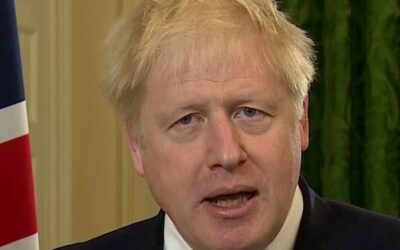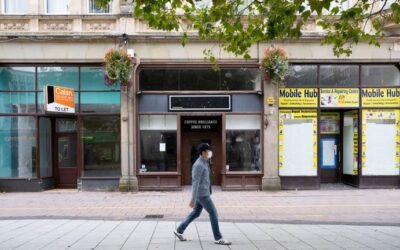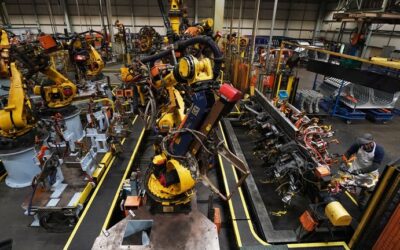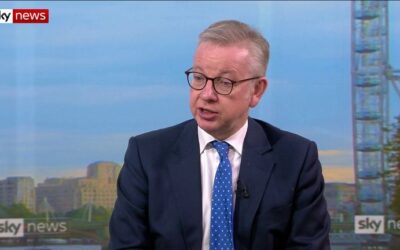Boris Johnson continues to believe there is “no basis” to resume trade negotiations with the EU, despite the bloc’s offer to “intensify” talks and discuss legal texts.
With negotiations on a post-Brexit trade deal teetering on the brink of collapse, the EU’s chief negotiator Michel Barnier held a call with his UK counterpart, Lord Frost, on Monday.
Mr Barnier had been told not to bother travelling to London for face-to-face talks as he had previously intended.
This came after the prime minister claimed the EU had “abandoned the idea of a free trade deal” following a bust-up after last week’s EU summit.
Please use Chrome browser for a more accessible video player
PM’s no deal Brexit warning
During his call with Lord Frost, Mr Barnier appeared to reach across the divide between the two sides, amid anger from UK negotiators over the bloc’s stance towards the negotiations.
Advertisement
“I confirmed that the EU remains available to intensify talks in London this week, on all subjects, and based on legal texts,” Mr Barnier posted on Twitter after the pair’s conversation.
“We now wait for the UK’s reaction.”
More from Brexit
Downing Street welcomed the “constructive discussion” but called for a further shift in position from Brussels before agreeing to resume formal negotiations.
“The UK has noted the EU’s proposal to genuinely intensify talks, which is what would be expected at this stage in a negotiation,” a Number 10 spokesman said.
“However, the UK continues to believe there is no basis to resume talks unless there is a fundamental change of approach from the EU.
“This means an EU approach consistent with trying to find an agreement between sovereign equals and with acceptance that movement needs to come from the EU side as well as the UK.
“The two teams agreed to remain in close touch.”
:: Subscribe to the All Out Politics podcast on Apple Podcasts, Google Podcasts, Spotify, Spreaker
Lord Frost also tweeted: “Constructive discussion with @MichelBarnier today.
“Noted his proposal to intensify work, as we have been asking. But the EU still needs to make a fundamental change in approach to the talks and make clear it has done so.
“We will stay in close touch.”
Mr Barnier’s offer to “intensify” talks came at the same time as senior cabinet minister Michael Gove, who is in charge of no-deal planning, told the House of Commons that further negotiations would be “meaningless” unless the EU changes its position.
He accused the bloc’s leaders of having “in effect ended the trade negotiations” with their conclusions from the European Council summit in Brussels last week.
“The conclusions of that Council reaffirmed the EU’s original negotiating mandate, they dropped a reference to intensive talks that has been in the draft and they declared that all, all future moves in this negotiation had to be made by the UK,” Mr Gove told MPs.
He added that Brussels was “not forthcoming” in attempts to intensify talks, continuing: “The EU was only willing to conduct negotiations on fewer than half the days available and would not engage on all of the outstanding issues.
“Moreover, the EU refused to discuss legal texts in any area as it has done since the summer.
“Indeed it’s almost incredible to our negotiators we have reached this point in the negotiations without any common legal texts of any kind.”
Please use Chrome browser for a more accessible video player
What? Ex-PM baffled by Michael Gove answer
The government has launched a new campaign to urge businesses to step up their preparations for the end of the Brexit transition period on 31 December and a possible no-deal outcome.
Mr Gove told MPs that “come what may, on 31 December, we will take back control”, although he acknowledged the failure to agree a trade deal could cause some difficulties.
“We recognise that there will be some turbulence, but we’ve not come so far to falter now when we are so close to reclaiming our sovereignty,” he added.
Having been informed of Mr Barnier’s tweet as he spoke to MPs, Mr Gove claimed the UK’s “firmness” was now “bearing fruit”.
“I now believe it is the case that Michel Barnier has agreed to the intensification of talks and also to working on legal texts,” he added.
“I think a reflection of the strength and resolution our prime minister showed, in stark contrast to the approach on which the Opposition have often enjoined us of simply accepting what the EU wants at every stage.”
Image: Michael Gove claimed the UK’s ‘firmness’ was now ‘bearing fruit’. Pic: UK Parliament/Jessica Taylor
Mr Gove said the UK would “need to make sure that we work on the basis of the proposed intensification” from the EU.
“I prefer to look forward in optimism rather than necessarily to look back in anger,” he told MPs.
Labour’s shadow Cabinet Office minister, Rachel Reeves, called on the government to be “honest” about the problems of exiting the transition period without a trade deal.
“They can call it no deal, they can call it an Australia deal, they can call it a Narnia deal as far as I’m concerned, but let’s be honest about what that means – and let’s be honest about how damaging it is for the country,” she said.
Analysis – Has the UK’s tough talk shifted the dial?
By Kate McCann, political correspondent
Just as Michael Gove got to his feet in the House of Commons to bemoan the EU’s refusal to intensify trade talks, Michel Barnier tweeted to say his side is prepared to do exactly that.
“The EU remains available to intensify talks in London this week, on all subjects, and based on legal texts. We now wait for the UK’s reaction,” he posted.
This is quite a shift and timed for maximum impact.
The UK has taken a tough position, refusing to hold face-to-face talks this week without a promise that the EU is willing to work through the night to resolve outstanding issues on fishing and state aid.
Such a statement from Mr Barnier could well spell the resumption of talks.
Both sides want a deal but something had to shift the deadlock, could it be that Boris Johnson’s decision to talk tough has forced some movement, however small?
The next few days will be crucial to see whether both sides are posturing or whether an agreement can be reached.
During the statement, Theresa May warned again that without a deal there will be major damage to the UK’s security regime.
Mr Gove said the UK would not accept major compromises in order to agree on security, prompting the former prime minister to screw up her face and mouth “what” from the backbench.
Scepticism remains about the government’s tactics.
There are many who believe the UK is playing a dangerous game in these final weeks in a bid to win concessions from the EU, talking tough despite wanting a deal.
But if those tactics shift the dial enough to secure a fresh round of more intensive talks it may well be worth the risk.










